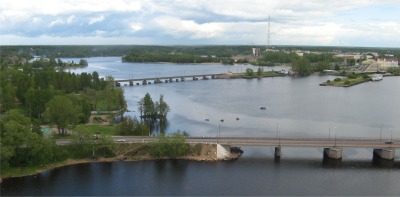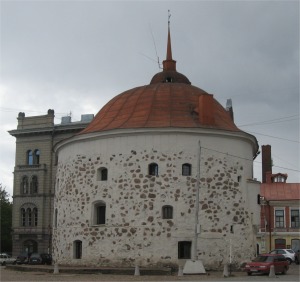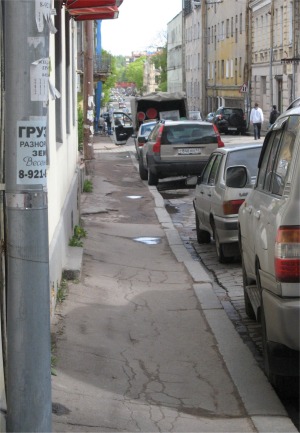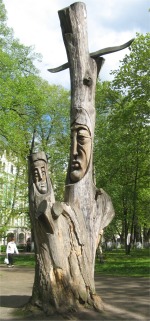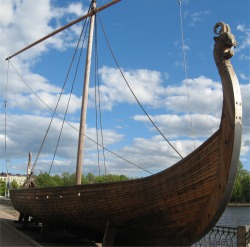We made an early start and joined the commuters heading for the metro. Going down the long escalator, I could see what seemed to be ants streaming towards the bottom of the escalator, and soon they were approaching like a growing caterpillar and metamorphosing into an endless line of people. I was amazed at how quiet it was, with next to no conversation taking place. Later, as we changed metro trains, I was equally amazed as we all headed along as silent sheep to the adjacent line in silence. London's commuters are equally taciturn, but the silence here was eerie. We finally reached Finland Station where we would catch a train to Vyborg. Making enquiries about the trains was extremely difficult since nobody seemed to speak English. We gathered, through a mixture of phrase books and sign language, from three different people that the journey would take from 2 to 3.25 hours - gulp! With such a lengthy trip ahead of us, I made a dash for the toilet (just as well since there were no toilets on the train), only to discover that just the squat variety existed at this station, and I needed to go and find the toilet paper elsewhere, eventually located on a centralised 1m diameter drum.
The train we boarded was a very functional commuter train, with seats designed for lack of comfort to prevent folk from falling asleep. Our iron horse slowly crawled out of the city through very industralised suburbs, passing a ghastly looking prison bristling with razor wire and tall watchtowers.
A while later found us clattering through thick forest, in fact the rest of the journey was through the same dense forest. Occasionally the train would lurch to a halt and the odd one or two passengers would alight or disembark - did they all work for the forestry commission? A handful of these stopping points were ramshackle hamlets with allotments and animals being fattened for the slaughter, but the majority just marked the ends of mysterious paths that disappeared off into the dark beyond. This was the vast hinterland as I imagined it.
To ease the boredom of the journey, an endless stream of on board entertainment passed along the train. This took the form of individuals who entered at one end of the carriage, stood by the door and shouted out their wares before passing down the aisle making what sales they could, and then leaving from the opposite end of the carriage. Folk were selling snacks, drinks, fruit, vegetables, pastries, bags, papers, magazines, books, poetic tracts, cloths for cleaning glasses, household goods and all manner of things.
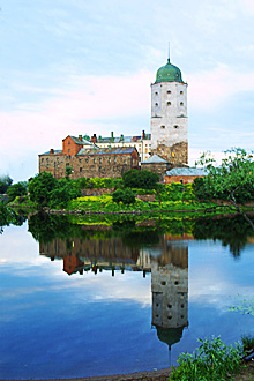 Vyborg Castle |
For centuries the area around Vyborg saw the bitter rivalry between Russia and its neighbours. The Vyborg Castle, built in 1293 on a small island, Linnan-Saari, off the Baltic coast, was a powerful Swedish stronghold. The castle was blocking a major trade route between the Russian merchant city of Novgorod and the Baltic Sea. With its tall Olaf Tower, the castle was built with the latest fortification technology of the day. The Russian forces of the Principality of Novgorod laid siege to the castle several times but unsuccessfully. In 1318 the army of Novgorod managed to take the castle, but failed to establish tight control over the area and had to retreat.
In 1561 the Olaf Tower was rebuilt on the orders of King Gustav Vasa. It became a little shorter, but with thicker walls and more powerful defences. In 1564 additional fortifications were added, including outer walls and powerful bastions paved with stone.
When Peter the Great founded St. Petersburg in 1703 and Russia gained access to the Baltic, all Swedish outposts in the area were captured. In 1706 the first ground assault on Vyborg failed, but in 1710 Peter the Great summoned 13,000 troops and 250 ships for a combined army and navy attack on the fortified town and castle. On June 12 1710, after a heavy bombardment, the Swedish garrison surrendered. With the construction of yet more fortifications, Vyborg maintained military significance till the early 19th century.


